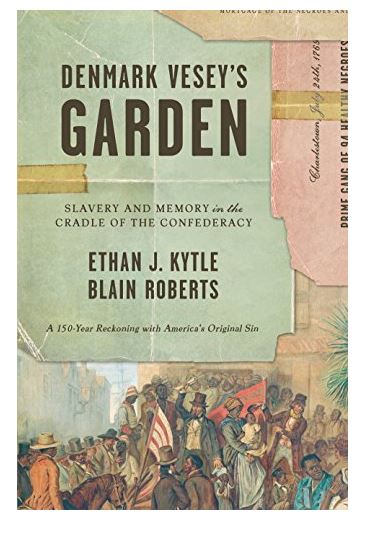
by Ethan J. Kytle
Named one of the “Best Civil War Books of 2018” by the Civil War Monitor
A Kirkus Reviews Best Book of 2018
2018 George C. Rogers Jr. Book Award Finalist
Named one of the “Summer Books 2018” selection by Times Literary Supplement
Named one of the “17 Refreshing Books to Read This Summer” by The New York Times
“A rigorous and timely study.”
—Black Perspectives
“Those who dismiss contemporary opposition to the Calhoun Monument as misplaced ‘political correctness,’ need to read Denmark Vesey’s Garden, which shows the deep provenance of black Charlestonian’s opposition to both Calhoun the man and the symbol.”
—The Post and Courier (Charleston)
“A fascinating and important new historical study. Denmark Vesey’s Garden: Slavery and Memory in the Cradle of the Confederacy, by Ethan J. Kytle and Blain Roberts, examines Charleston as the capital of slavery in the United States and, therefore, the place where the ways slavery is remembered matter most. This book examines rival sets of memories: from a segregated tourism industry, which not long ago gave out different sets of information to different people, to today’s fights over Civil War monuments.”
—Janet Maslin, The New York Times
“Denmark Vesey’s Garden: Slavery and Memory in the Cradle of the Confederacy is vital to understanding some of the deepest fault lines in American life. . . . An excellent history of the divergent views of slavery.”
—Shelf Awareness
“A stunning contribution to the historiography of Civil War memory studies [that link] the memories and actions of black and white Charlestonians over the years to the present-day ideas motivating extremists like Dylann Roof. . . . This book speaks to the present as eloquently as it narrates the past.”
—Civil War Times
“The authors do an excellent job of tracing and exploring those competing visions [of slavery]. . . enriched by insightful analyses. . . . Those who read it will not just learn how the institution has been remembered but also wrestle with the ramification of America’s slave past for its present and future.”
—Civil War Book Review



